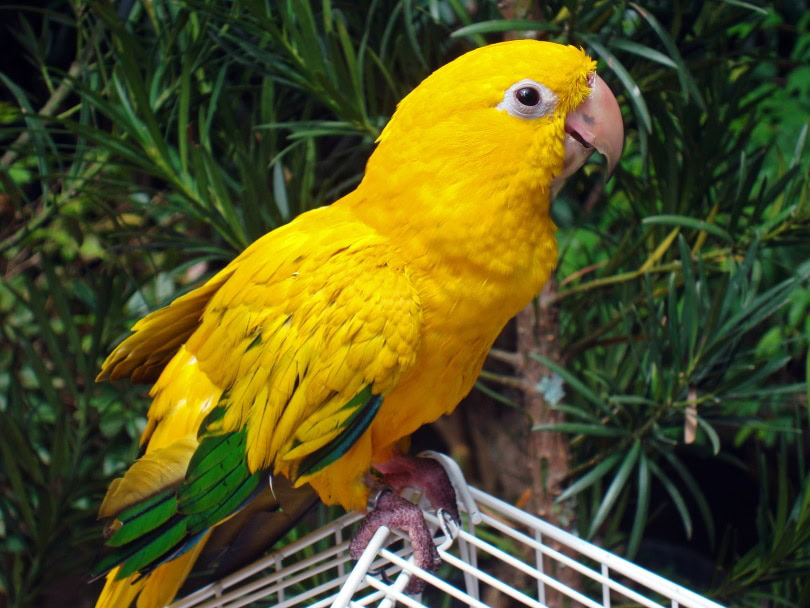Conures are remarkable birds that can live for between 25 and 50 years in captivity. They also have the unique ability to mimic our speech. Unfortunately, they can’t convey ideas through human words, so pet owners must learn to read their parrots’ body language to know how they feel about what’s going on around them.
Whether you’re currently the proud owner of a conure or are thinking of adopting one, read on to learn a few simple methods for figuring out what your bird is thinking.
The 8 Signs & Signals of Conure Body Language
1. Look Out for Preening
A healthy conure will preen itself regularly to stay well-groomed, but a bird that simply sits around and plucks at its feathers may be experiencing boredom or worse, depression. This problem can cause you to lose confidence in your bird’s happiness, so it’s important to address it right away.
Start by giving your bird extra attention and playing with it regularly. It doesn’t take much for birds to regain their sense of fun and well-being!
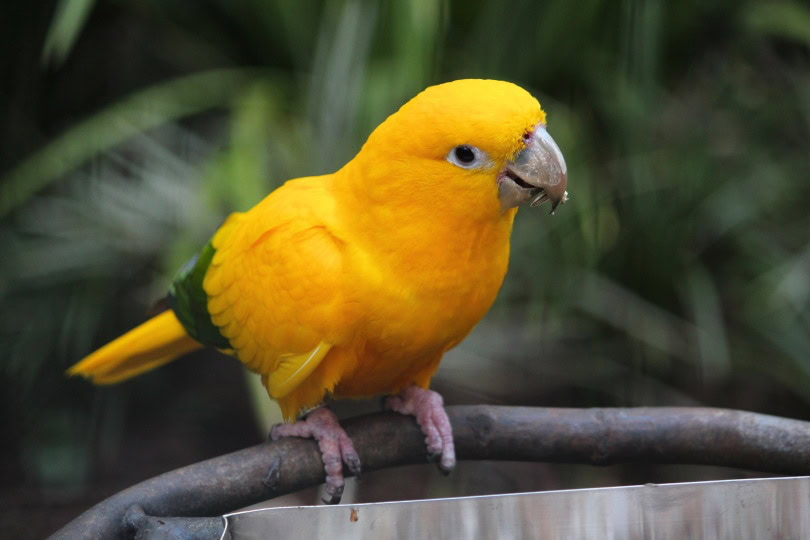
2. Listen to Its Voice
There are many ways you can interpret your parrot’s voice: where it’s coming from (mouth or beak), the tone, and whether it is loud or quiet. Think about how you would feel if someone was talking to you in that same tone of voice, and use this method of advanced observation when trying to figure out what your bird is saying.
For example, an African grey parrot will generally be quiet (in fact, they’re the quietest of all pet parrots). They are known to barely make a peep when expressing their anger, sadness, or boredom. So, if you notice your grey is being noticeably more silent than usual, perhaps it’s feeling that way for a reason.
Tthe opposite can also be true. If you hear your parrot talking loudly and clearly, it could mean that it’s in a good mood!
3. Watch Its Balance
Conures are strong and stable fliers that can easily maneuver about the room without a problem. If it loses this skill, there could be something wrong with its cardiovascular system or a number of other issues.
If your conure is unstable on the ground and willingly steps up onto your hand or play stand, it could be ready for special attention. After all, trust-building requires an effort on the bird’s end too, and it should not be pushed too far if it isn’t interested in stepping up to your hand right away.
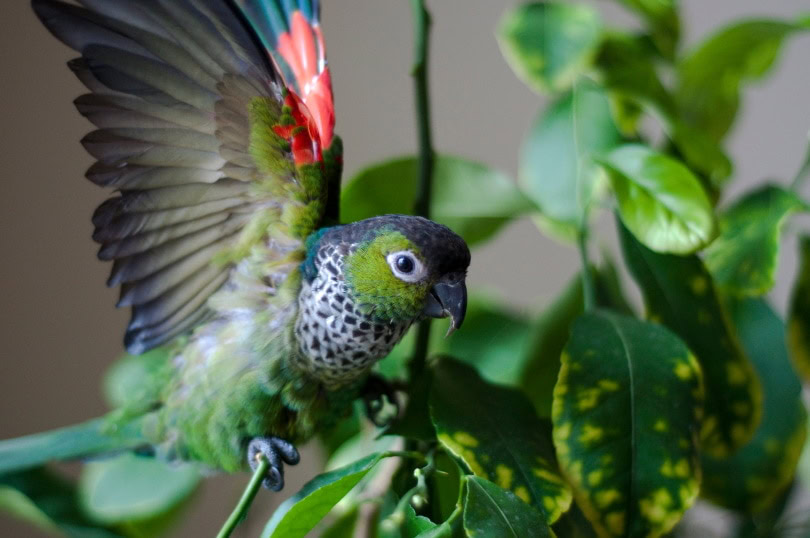
4. Look at Its Posture
A healthy bird will have a straight posture and will be alert in its movements. If it seems hunched or tired, it could be a sign of something serious. Birds that are sick or injured may sit awkwardly, and if this is the case, it’s best to take your bird in for a check-up with your veterinarian.
A parrot that has been abused will carry itself differently from a properly nurtured bird, making it much easier to spot these differences when you’re familiar with both kinds of postures.
5. Observe Its Wings
If your conure is trying to get some air, it will be flapping its wings excessively and looking at you with curiosity. If the bird’s wings are in motion, but there doesn’t seem to be any deliberate direction behind them, you should check for signs of pain because it could be in great discomfort.
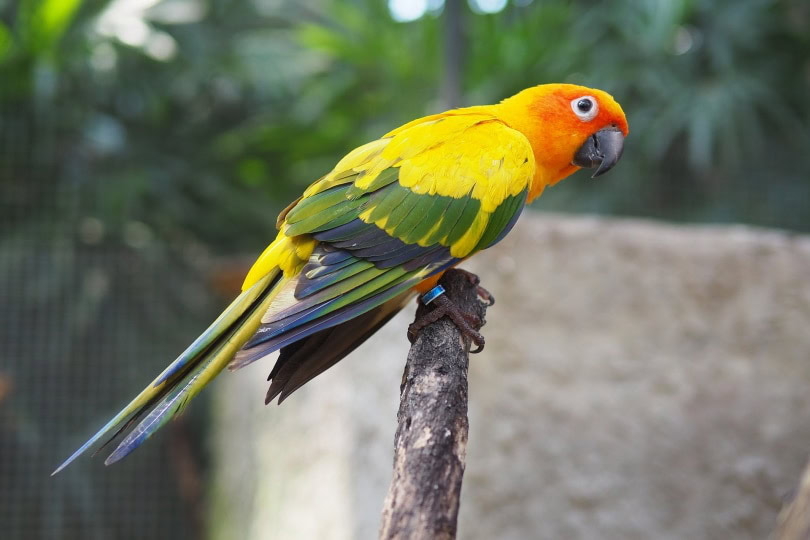
6. Watch For the “Happy Dance”
Conures have ways of letting you know when they’re happy and enjoying themselves. Make sure you know how to read conure body language so you can understand when it’s a good time to give your bird special attention!
If you see your bird wag its tail and ruffle its feathers, it’s a good time to get in on the fun. This is similar to what a cat does when it rubs up against you, but with this move, your bird will spread its wings out slightly while dancing around.
Head bopping, in which your bird will move its head from side to side, is another good sign. This could mean curiosity or playfulness (or both!). If you see your conure balancing on one foot and swaying, you can expect it to do a jumpy hop next!
7. Observe Its Energy Level
If your conure is running around at bird speed and wandering about the room, you can assume that it doesn’t have any problems. If your beloved bird seems lethargic or reluctant to move, it could be an indication of loneliness, depression, or even illness. Be sure to make a quick visit with your avian veterinarian to see what they can find.
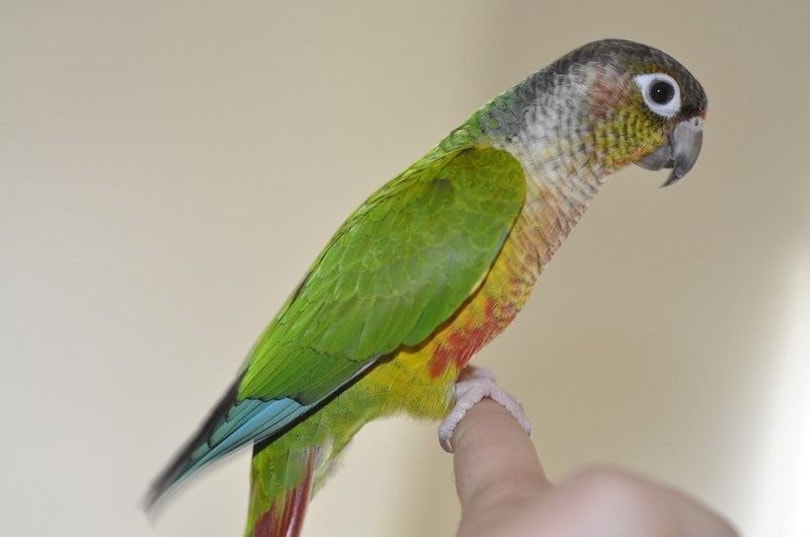
8. Watch Its Eyes
Just as humans use their eyes as a primary method of communication, so do parrots. If you notice that your bird is squinting or covering its eyes, it could be in pain.
An alert bird will have clear eyes with no discharge or tearing; if you see these signs, then your parrot may need medication and a trip to the vet.


Note: It’s a Two-Way Street
Conures read your body language too! It’s simply in their nature, so they’re going to be paying close attention to how you act. They learn what they can and can’t do by watching first. Your actions will teach them what to expect from the world at large, and theirs will do the same for you.
This is why you should never be aggressive toward your conure, even when you are angry. If you’re mad, wait until you have calmed down so your actions and body language are not aggressive. Don’t take it out on your pet.
Conures are extremely sensitive birds and “tune in” to their owners’ emotions quickly. To reprimand your pet when they do something wrong, make sure you approach them calmly, and use a quiet yet firm voice. Your conure needs to know that their actions got them in trouble, not because of any aggression from you.

Final Thoughts
Whether you’re thinking about getting a conure or already have one, you should know how they communicate and what their body language means. By observing your pet bird’s beak, eyes, and movements, you can tell if your winged friend is happy or if something’s bothering them, which will lead to a better experience for everyone! Certain signs can indicate that something may be wrong with your conure, in which case, you should consider taking it to the vet.
If you don’t understand your bird’s body language right away, don’t worry. The more time you spend with your bird, the easier it will get.
- See also: Golden-Capped Conure
Featured Image Credit: Wagner Campelo, Shutterstock
